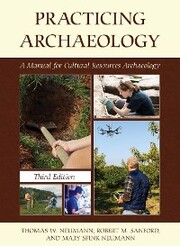Detailansicht
Practicing Archaeology
eBook - A Manual for Cultural Resources Archaeology
ISBN/EAN: 9781538159392
Umbreit-Nr.: 8691103
Sprache:
Englisch
Umfang: 496 S.
Format in cm:
Einband:
Keine Angabe
Erschienen am 15.08.2022
Auflage: 3/2022
E-Book
Format: EPUB
DRM: Adobe DRM
- Zusatztext
- <p><span>This comprehensive text and reference book addresses the questions and problems of cultural resources archaeology for undergraduate and graduate students and practicing archaeologists. Neumann, Sanford, and Neumann use their decades of field experience to discuss in great detail the complex processes involved in conducting a cultural resources management (CRM) project. Dealing with everything from law to logistics, archival research to artifact analysis, project proposals to report production, they provide an invaluable sourcebook for archaeologists who do contract archaeology. After introducing the legal and ethical aspects of CRM and stakeholder engagement, the authors describe the processes of designing a proposal and contracting for work, doing background research, conducting assessment, testing, mitigation work (Phase I, II, and III), laboratory analysis, and preparing reports for project sponsors.</span></p><p></p><p><span>The volumes emphasis on practical problems, use of extensive examples, and detailed advice on a host of subjects make it an ideal manual for archaeologists and field schools. This revised and expanded third edition of</span><span>Practicing Archaeology: A Manual for Cultural Resources Archaeology</span><span> updates Federal and state contracting protocols and covers preparing safety plans for occupational hazards, organization of an archaeology laboratory, use of electronic technology and digital media, advice on field and personnel management, and how to make a living doing cultural resources archaeology.</span></p><p></p><p></p>
- Kurztext
- <p><span>Heres the perfect one-stop for courses in field archaeology and archaeologists just beginning their initial field work. Current, up-to-date and comprehensive, this is how its really done in the field.</span></p><p></p><p></p>
- Autorenportrait
- <p><span>THOMAS W. NEUMANN</span><span> established, then directed for many years, the doctoral program in anthropological archaeology at Syracuse University, served as a research associate for the State University of New York Research Foundation, and since 1985 has worked as a corporate archaeologist and research administrator, serving variously as senior partner or senior scientist for national cultural resources firms.</span></p><p><span>Neumann is the author or co-author of over 80 books and monographs, and has published articles in</span><span>Current Anthropology</span><span>,</span><span>American Antiquity</span><span>,</span><span>American Archaeology</span><span>,</span><span>Midcontinental Journal of Archaeology</span><span>,</span><span>Plains Anthropologist</span><span>, and the</span><span>Journal of Middle Atlantic Archaeology</span><span>, to name a few.</span><span></span></p><p><span>Neumann has served as an external grants reviewer for the National Endowment for the Humanities and for the National Science Foundation, and as a member of the Board of Directors of the Georgia Council of Professional Archaeologists. Amongst various historic preservation awards, he was co-recipient of the Honor Award from the National Trust for Historic Preservation (1992) for his work on the Third Haven Meeting House in Easton, Maryland. He has received a number of awards for outstanding teaching, including from Phi Beta Kappa in 2006 as visiting faculty at Emory University, something Emory normally does not allow.</span></p><p><span>ROBERT M. SANFORD</span><span> served for several years as a research associate for the State University of New York Research Foundation and later as a partner and corporate archaeologist in New York cultural resources firms. Sanford taught anthropology, environmental science, and environmental policy as adjunct faculty at the Community College of Vermont, Johnson State College, and Antioch New England Graduate School. He currently is a faculty member in the University of Southern Maines Environmental Science and Policy Program, a position he has held since 1996.</span></p><p><span>His articles treating archaeology, environmental policy, and landscape analysis have appeared in</span><span>The Environmental Professional</span><span>,</span><span>Land Use Policy</span><span>,</span><span>Journal of Vermont Archaeology</span><span>,</span><span>American Archaeology</span><span>, and</span><span>American Antiquity</span><span>.</span></p><p><span>MARY SPINK NEUMANN</span><span></span><span>(nee Mary L. Spink taught Anthropology as an instructor and served as an archaeometric laboratory technician at the Pennsylvania State University. She worked as a field assistant or senior technician in Pennsylvania cultural resources firms. At the behest of the Honduran government, she conducted research on the countrys prehistoric ground stone tools as a U.S. Agency for International Development Academic Specialist and as a Senior Fulbright Research Scholar. Between 1987 and 2018, she was employed by the U.S. Centers for Disease Control and Prevention (CDC) as a Behavioral Scientist in infectious diseases. Neumann is currently a Senior Research Fellow and Consulting Archaeologist at the Pocket ParkWentworth Analytical Facility.</span></p><p><span>She has published articles on archaeology ranging from</span><span>Yaxkin</span><span> to the</span><span>Journal of Middle Atlantic Archaeology,</span><span> and on public health and safety in</span><span>PLoS ONE</span><span>,</span><span>American Journal of Public Health</span><span>,</span><span>Journal of Infectious Diseases</span><span>,</span><span>Public Health Reports</span><span>, and the</span><span>MMWR</span><span>(</span><span>Morbidity and Mortality Weekly Report</span><span>), amongst others.</span></p><p></p><p></p><p></p><p></p>
